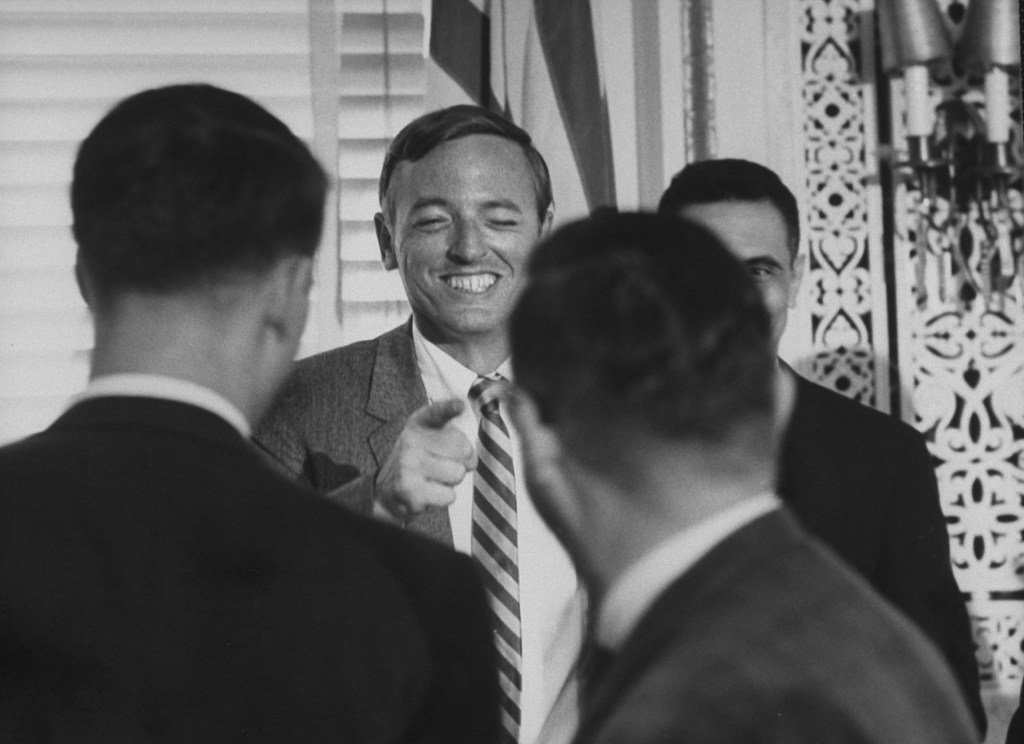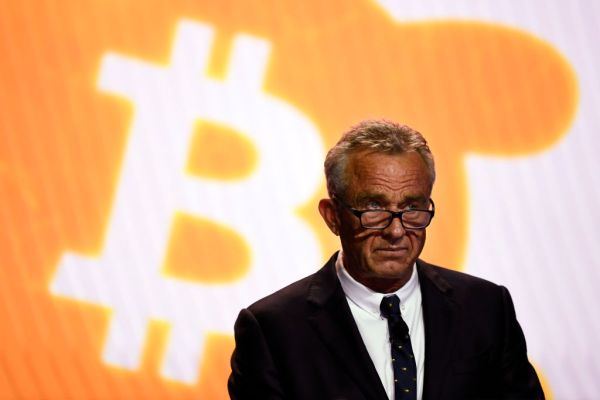For a man whose name is practically synonymous with the idea of responsible conservatism, it’s surprising that one of the strongest conclusions the reader draws about William F. Buckley Jr. from Sam Tanenhaus’ Buckley: The Life and the Revolution That Changed America, is the man’s extraordinary liberality in how he chose his friends.
Buckley’s ability to like essentially everyone (except Gore Vidal) comes through again and again. Charmingly, when he befriends ideological and cultural opposites like Jesse Jackson, Truman Capote, and John Kenneth Galbraith. Movingly, when Buckley paid for surgeries out of pocket for professional friends and helped apostates from the conservative movement get jobs. And, often, disturbingly: His unswerving loyalty to Roy Cohn, his taking at face value of Augusto Pinochet’s denial of political killings, and his ceaseless advocacy for Edgar Smith, a murderer who got out of jail early in large part due to Buckley’s advocacy, then nearly killed again only a few years later. Tanenhaus rightly analyzes that misplaced certitude as essentially pathological: Buckley was often subject to “faith’s dark twin, delusion,” he writes.
But such certitude was, Tanenhaus writes, part of his “genius for friendship,” the ability to genuinely appreciate people for who they were and to be interested in what they had to say; the reason that Tanenhaus claims that the television show Firing Line was Buckley’s greatest achievement as a journalist, with its cerebral, serious, and civil explorations of nearly every great political issue of the latter half of the 20th century. It was also how Buckley was able to identify and cultivate some of the most important political writers of the 20th century, including Garry Wills, Joan Didion, George Will, and David Brooks, remaining loyal to them even if some became ideological apostates.
That sense of loyalty and friendship, the openness to experience that appeared to make Buckley congenitally unable to believe the worst about people he knew, especially those in his circle, were at the core of some his worst moments: his advocacy for McCarthyism, his sometimes loose grasp of journalistic ethics, and his embrace of the segregationist cause, which Tanenhaus exposes as much more throughgoing than is commonly understood.
The story of Buckley’s most fundamental relationship, to his sprawling family, takes up most of the first quarter of the book and much of the rest. It’s where Tanenhaus does his best archival work, diving deeply into the views of the Buckley patriarch, W.F. Buckley Sr., an oilman who lost his first fortune to the Mexican Revolution, smuggled guns across the border to Mexican counterrevolutionaries, hosted dinner guests like Albert Jay Nock in the Buckleys’ Spanish-style estate in Connecticut, and was prone to outbursts about Jews and “pinkos.”
The Buckley patriarch, and by extension his family, was deeply influenced by his upbringing in Texas and California. In the words of one friend, via Tanenhaus, “You’ve got to understand that he’s a Catholic aristocrat of the Spanish persuasion. That’s the bottom of the thing.”
To put it delicately, the senior Buckley instilled some distinctly illiberal political impulses in his children: Several of Buckley’s siblings once burned a cross on the lawn of a Jewish neighbor, and his sisters desecrated a local Episcopal church because of its rector’s pro-intervention sentiment during the lead-up to World War II, causing a local scandal. These incidents are fairly well-known, and were often dismissed as regrettable indiscretions by Buckley and his allies.
But Tanenhaus shows how Buckley’s father’s politics were not entirely cast off. Buckley, for example, retained his father’s “old right” impulses throughout his career, backing Latin American dictatorships like Augusto Pinochet and writing that Francisco Franco only engaged in as much repression as was “necessary.” Still, after the all-important crusade against communism had been won, he became far more skeptical of U.S. involvement in the wider world, opposing the Iraq War as a lonely voice on the right.
One May review criticized Tanenhaus for dwelling on Buckley’s “gradualist” (in the reviewer’s words) views on race, but gradualism is an especially friendly descriptor of Buckley’s opinions, especially considering the profound influence of Willmoore Kendall on Buckley and the early years of the conservative movement. Kendall, who along with James Burnham was the conservative theorist Buckley most revered, argued that democratic majoritarianism needed to take priority over liberalism’s guarantee of individual rights, which included endorsing Southern states’ right to enforce Jim Crow.
While not endorsing segregation as necessarily a positive good, Buckley and his magazine certainly thought federal intervention against it was bad. In 1965, for example, National Review completely mischaracterized the attack on marches in Selma, describing it, incredibly, as the result of police officers “provoked beyond endurance.” The magazine’s surprising respect for Malcolm X (who they praised more than Martin Luther King, Jr.), also stemmed from X’s rejection of integration.
For good or ill, however, the ideological debates hosted by National Review are, somewhat strangely, given relatively sparse treatment in Buckley. Tanenhaus clearly is more interested by Buckley as a literary figure, a consummate (and Ritalin-fueled) man of letters who could churn out editorials, sailing memoirs, surprisingly good spy thrillers, and absolute mountains of correspondence.
Tanenhaus mentions Donald Trump only once, in passing. But his presence, of course, haunts the biography. After all, how could a movement so interested in respectability produce a president who proudly appeared in a Playboy film? (Buckley’s contributions to that publication were purely literary.)
The answer, Buckley implicitly poses, can be found in the paradox of Buckley’s greatest virtues: loyalty and friendship. Simply put, his profound sociability and civility often landed Buckley in the wrong company. His defense of Southern segregation, according to Tanenhaus, in large part stemmed from a desire to defend his family’s life in Camden, where they treated their black workers with dignity and generosity. “Everyone, Black and white, wanted to work for the Buckleys,” the son of their groundskeeper told Tanenhaus. But it would take until the late 1960s for Buckley to fully reject the segregationist position.
“Again and again, the great gatekeeper of conservatism has a very difficult time holding those gates closed.”
Buckley was also longtime friends with one of Trump’s New York mentors, the political fixer and lawyer Roy Cohn. As late as the 1980s, Buckley was serving as a character witness for Cohn, telling the New York State Bar that any “lack of integrity” on Cohn’s part was “a priori inconceivable.” Strange talk for a man who, a year later, would tell a biographer the story of how Cohn had swindled a close friend and conservative ally, Marvin Liebman.
Again and again, the great gatekeeper of conservatism has a very difficult time holding those gates closed. Sometimes, it even seems like he opened them wide, as during Watergate: As George Will told John Judis, quoted by Tanenhaus: “They [National Review writers] didn’t really like Nixon until he was a criminal.” To be fair, in this case Buckley slammed the gates shut again rather quickly: Buckley’s brother, Sen. James Buckley of New York, was one of the first conservatives to call for Nixon’s impeachment, at Bill’s urging. But the long train of dubious figures he publicly defended—Charles Lindbergh, J. Edgar Hoover, Joseph McCarthy—paints a picture of a man who often refused to see what was right in front of his nose until far too late.
But Buckley also tells the story of a man who elevated American political discourse, crafting an articulate argument against the stale orthodoxies of the New Deal consensus; airing debates with radical feminists, black nationalists, and left-wing icons like Noam Chomsky on national television; and continually delighting in poking a finger in the eye of self-righteous liberals. The Buckley who emerges is, in many ways, just as much of a countercultural figure as his antagonist Gore Vidal; both sought to upset and overturn midcentury American culture, which they saw as tired and complacent.
Tanenhaus himself was one of Buckley’s many friends: The book took 25 years to write, during which the author was granted extensive access to Buckley, his family, and his likely unparalleled set of contacts. One of the greatest testaments to Buckley given by this biography is the absolutely stunning amount of personal interviews Tanenhaus is able to cite, drawing on those contacts: Buckley was clearly not afraid of a life story showing the defeats and disgraces alongside the triumphs.
Buckley, then, will hardly please conservatives who see American politics as being unambiguously improved by National Review and its attendant movement. It is far too critical for that. But Buckley also comes across as an undoubtedly great man, even if that greatness often waxes and wanes. In his moving, yet brief, description of Buckley’s last decades, Tanenhaus writes of the “imagination and generosity, the kindness and warmth, that Bill Buckley demonstrated time and again.” Indeed, we live in the world Buckley helped create, but we lack his virtues.










Please note that we at The Dispatch hold ourselves, our work, and our commenters to a higher standard than other places on the internet. We welcome comments that foster genuine debate or discussion—including comments critical of us or our work—but responses that include ad hominem attacks on fellow Dispatch members or are intended to stoke fear and anger may be moderated.
With your membership, you only have the ability to comment on The Morning Dispatch articles. Consider upgrading to join the conversation everywhere.